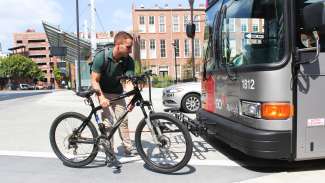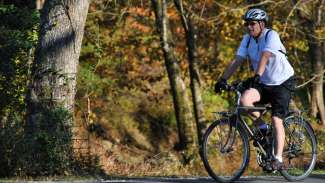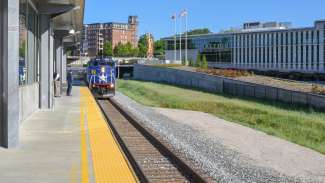Jump To:
Public Transportation
You don't need a car to get around Raleigh. The City offers public buses, a downtown circulator, and pick up services for people with disabilities. Find your public transit option
Greenways and Bicycle Lanes
The Capital Area Greenway system provides an alternate means of transportation and has over 100 miles of trails connecting Raleigh. There are 28 individual trails that make up the trail system, each with its own unique features, destinations, and character.
The BikeRaleigh program encourages biking in Raleigh through on-road facility design, cycling safety and education promotion, and encouragement events. BikeRaleigh’s primary goal is to promote bicycle use as a viable, attractive, non-polluting form of transportation and assure safe and convenient access to all areas of the City. Raleigh is home to three Silver Level Bicycle Friendly Businesses designated by the League of American Bicyclists, Red Hat, Kimley-Horn, and the American Diabetes Association of Eastern NC.
Raleigh’s bikeshare program, Cardinal Bikeshare, is a partnership between the City of Raleigh and Bewegen Technologies, Inc. Cardinal Bikeshare is a public self-serve bicycle rental system for short trips, across 30 stations. Half of the fleet is equipped with electric-assist motors that will provide riders with an extra boost when pedaling.
Raleigh Union Station
This train station in the City’s downtown Warehouse District was built accommodate current and future demand for intercity passenger rail, commuter rail, buses, taxis, bicycles and other forms of transportation. There are now four daily round-trip trains available from Raleigh to Charlotte.
Raleigh-Durham Airport
Raleigh-Durham Airport (RDU) serves 10 major airlines and serves several non-stop destinations. In 2019, the airport served 14.2 million passengers.
Internet Access
From the high-tech Raleigh Convention Center to Wi-Fi networks in public locations all over town, Raleigh is linked up. The City of Raleigh is expanding its internal fiber network to enhance communications efficiencies, reducing municipal expenses and taxpayer burden. The city also provides broadband services to underserved areas, and offers youth programs for technology training and mentoring.
When regional or national high-tech conferences are hosted at the Raleigh Convention Center, the city’s IT Department collaborates with organizers to provide technology support for the event and all attendees. Raleigh also provides broadband access to 1,482 homes in underserved areas throughout the city, funded by a grant from the Broadband Technologies Opportunity Partnership (BTOP). The City also participates in the Digital Connectors youth training program, a nationally renowned initiative that provides leadership and technology training paired with community service to young people aged 14-21.


